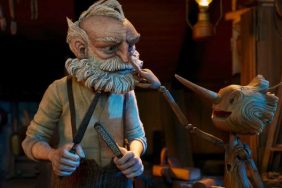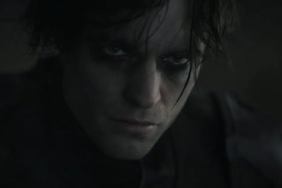
CraveOnline: What about the story itself? Obviously it’s based on a lot of Irish folklore and mythology, but did the idea start there? “I want to tell a story about selkies,” or did it start with the contemporary story and work backwards?
Tomm Moore: No, it started with the selkie story. I was reading selkie stories and reading some of that folklore, and wondering what were they? Why did they exist, why were they so prevalent in all these different stories? There’s this book called The People of The Sea, where somebody in the 1920s went and collected all these stories that were sort of fading from people’s popular belief systems. Pretty interesting, and I thought that they were all about loss. The common thread to them all is that they seem to deal with loss, or they help these coastal communities deal with loss.
So I thought that would be interesting to incorporate not into a period piece, but into something relatively contemporary. Even though I set it in the 80’s, so I guess it is a period piece, but in a more modern, more up to date version of those stories. The one thing I noticed in a lot of those stories, the kids were a little bit like an afterthought, where I thought it would be very interesting to tell the story from the point of view of the kids rather than from the father. Usually those selkie stories deal a lot with the husband that’s left behind.
That’s actually something I admired about the film, the way it dealt very directly with loss. I find a lot of kids films use loss, the loss of a family member, as a background. And then a kid befriends a basketball-playing dog.
[Laughs.] That’s a great idea for a movie!
“We didn’t want to pull any punches because that was the point of the movie.”
That’s a very different movie. But here you’re very confrontational about it. Was that ever a concern, or did you want to get as emotional as humanly possible? [Begin Spoilers.]
Oh, the point was to do that. The essence of the idea was to try and deal with that, to try and look at what was it about these stories that kept them so potent for so long. Rather than use that as a jumping off point we wanted it to be true to the point of the stories, and to deal with loss. The idea of it was to deal with loss, and that was stuff that was floating around in my personal life as well, that made me wonder, is there way to use these old allegories to help modern kids deal with that kind of thing?
I think there’s a tendency on the part of storytellers to mollycoddle kids when it comes to serious issues, and I don’t see you doing that here…
We actually rolled back a little bit! [Laughs.] One of the things that we had in early drafts, which I realize now wasn’t the right thing to do, but in early drafts we’d have Saoirse, the little girl, at the end leave with the mother. Which was just too much. It was just WAY too much. [Laughs.] For me, we toned it done from how tragic it could have been. It could have been a bit too bleak altogether. That ending undermined Ben’s journey, really. He’d come to understand and accept her, and then not to have the rest of his life as the older brother he should have been would have cheapened his whole journey. So of course it made sense to have her stay.
[End spoilers.]
But otherwise, yeah, we didn’t want to pull any punches because that was the point of the movie. We even tried a draft at one point where, instead of the traditional hero’s journey structure, we tried to see if we could use Elizabeth Kübler-Ross’s stage of grieving as story points. We built a whole metaphorical, mythological structure based on those, with different characters that represented the different stages like anger, or denial, all that stuff. But it was way too complex and bloated and we pulled it back to something very much focused on what was going on in this kid’s story.
I kind of realized after a while that my favorite part was really the first 20 minutes, which has a little touch of the magic but otherwise is pretty much a kitchen sink drama of this family dealing with the absent mother, you know? We realized that the power in the mythology was that it could be an exaggerated version of what was going on for those characters in the real world, as it were. So that’s what we pared it down to. The witch, which was a parallel to the grandmother, and the giant, which was a parallel to the Dad.








